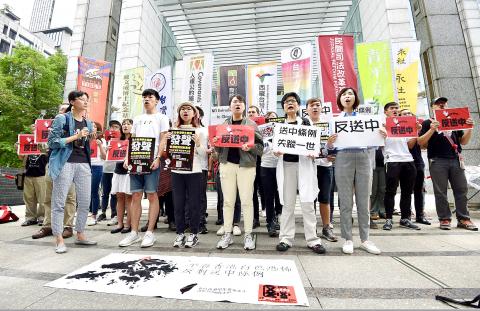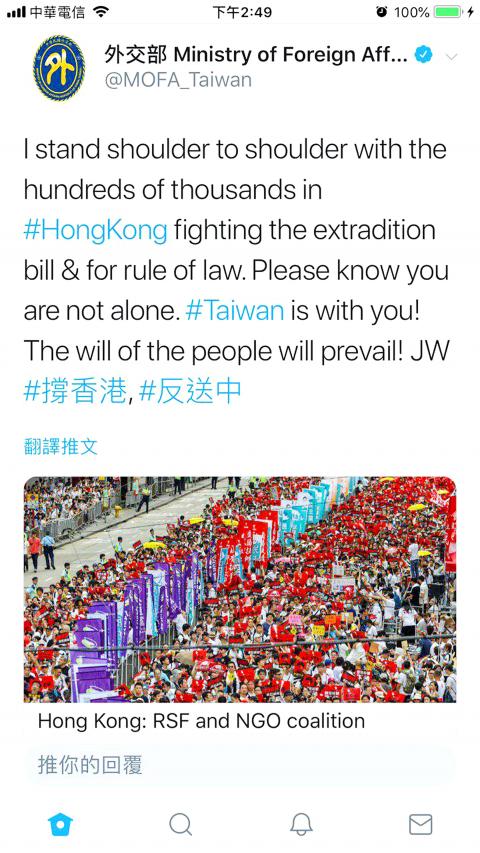A coalition of civic groups and students yesterday rallied separately outside Hong Kong’s representative office in Taipei to protest a controversial extradition bill in Hong Kong.
More than 30 advocates from more than 20 groups shouted: “Shame on you, Hong Kong government” and “Say no to the extradition bill” outside the Hong Kong Economic, Trade and Cultural Office.
Among the protesting groups were the Taiwan Association for Human Rights, Human Rights Watch, the Taiwan Citizen Front, Amnesty International and Taiwan March.

Photo: Peter Lo, Taipei Times
The protesters demanded that the Hong Kong government withdraw its proposed amendments to the extradition law, which would allow visitors in or passing through Hong Kong who are deemed “suspects” by the Chinese government to be sent to China for trial.
They also reiterated calls for the Taiwanese government to plan countermeasures to the bill.
If the legislation passes, the government should consider canceling the special legal status granted to Hong Kong officials and investors with Chinese ties to ensure Taiwan’s national security and lodge a complaint with Beijing, Taiwan Citizen Front founder Lai Chung-chiang (賴中強) said.

Photo: Screengrab from the Ministry of Foreign Affairs’ Twitter account
“We hope the countermeasures would only deal with Hong Kong officials and investors, and not affect the rights and interests of Hong Kongers traveling to and studying in Taiwan,” he said, urging all political parties and presidential candidates to state their stance on the bill.
Following the protest, about 200 Hong Kong students gathered outside the representative office for another rally.
One of the event organizers, Ho Wing-tung (何泳彤), a Hong Kong student at Chinese Culture University, said that the students walked out of class to show support for their compatriots on strike in Hong Kong.
“We understand that the protest might be useless, but we want the government to know that we will not do nothing,” she said.
While Hong Kong has never had democracy, Hong Kongers will fight to keep its rule of law, she added.
Later yesterday, the Chinese Nationalist Party (KMT) issued a statement saying that it has been paying close attention to protests against the extradition bill, and hopes the Hong Kong government and people would discuss the bill rationally and improve its legal basis.
Authorities should respond to the public’s calls with compassion so that the event could be concluded peacefully, it added.
Asked to comment on a rally in Kaohsiung to protest the extradition bill, Kaohsiung Mayor Han Kuo-yu (韓國瑜) did not respond.
Reporters raised the question five times as the KMT presidential hopeful inspected a construction site for a daycare center, but Han avoided eye contact and quickly walked away in silence.
Separately, Hon Hai Precision Industry Co chairman and KMT presidential hopeful Terry Gou (郭台銘) told reporters at a National Police Day event in New Taipei City that the protests in Hong Kong showed the “one country, two systems” arrangement has failed, especially in the eyes of young people.
Authorities have made many great mistakes in implementing “one country, two systems” in the past few years, he added.
Former New Taipei City mayor Eric Chu (朱立倫), another KMT presidential hopeful, said that he hopes the Hong Kong Legislative Council would respect public opinion and ensure human rights and rule of law are upheld.
“The ‘one country, two systems’ arrangement has never been an option for Taiwan and Taiwanese will not accept it,” he told reporters when asked to comment at a financial technology summit in Taipei.
Meanwhile, Minister of Foreign Affairs Joseph Wu (吳釗燮) yesterday voiced his support for the protest in Hong Kong on the Ministry of Foreign Affairs’ official Twitter account.
“I stand shoulder to shoulder with the hundreds of thousands in #HongKong fighting the extradition bill & for rule of law. Please know you are not alone. #Taiwan is with you! The will of the people will prevail!” Wu wrote.
Additional reportiing by Lin Chia-nan

Nipah virus infection is to be officially listed as a category 5 notifiable infectious disease in Taiwan in March, while clinical treatment guidelines are being formulated, the Centers for Disease Control (CDC) said yesterday. With Nipah infections being reported in other countries and considering its relatively high fatality rate, the centers on Jan. 16 announced that it would be listed as a notifiable infectious disease to bolster the nation’s systematic early warning system and increase public awareness, the CDC said. Bangladesh reported four fatal cases last year in separate districts, with three linked to raw date palm sap consumption, CDC Epidemic Intelligence

The manufacture of the remaining 28 M1A2T Abrams tanks Taiwan purchased from the US has recently been completed, and they are expected to be delivered within the next one to two months, a source said yesterday. The Ministry of National Defense is arranging cargo ships to transport the tanks to Taiwan as soon as possible, said the source, who is familiar with the matter. The estimated arrival time ranges from late this month to early next month, the source said. The 28 Abrams tanks make up the third and final batch of a total of 108 tanks, valued at about NT$40.5 billion

Two Taiwanese prosecutors were questioned by Chinese security personnel at their hotel during a trip to China’s Henan Province this month, the Mainland Affairs Council (MAC) said yesterday. The officers had personal information on the prosecutors, including “when they were assigned to their posts, their work locations and job titles,” MAC Deputy Minister and spokesman Liang Wen-chieh (梁文傑) said. On top of asking about their agencies and positions, the officers also questioned the prosecutors about the Cross-Strait Joint Crime-Fighting and Judicial Mutual Assistance Agreement, a pact that serves as the framework for Taiwan-China cooperation on combating crime and providing judicial assistance, Liang

A group from the Taiwanese Designers in Australia association yesterday represented Taiwan at the Midsumma Pride March in Melbourne. The march, held in the St. Kilda suburb, is the city’s largest LGBTQIA+ parade and the flagship event of the annual Midsumma Festival. It attracted more than 45,000 spectators who supported the 400 groups and 10,000 marchers that participated this year, the association said. Taiwanese Designers said they organized a team to march for Taiwan this year, joining politicians, government agencies, professionals and community organizations in showing support for LGBTQIA+ people and diverse communities. As the first country in Asia to legalize same-sex